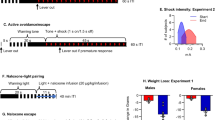Abstract
Independent groups of addicted rats were placed repeatedly in a conditioning procedure: pairings of non-rotatable activity wheels with periods of either 0–11 or 12–23 h of morphine deprivation. Controls consisted of a saline-injected group exposed to the same training stimuli and conditioning procedure, and a morphine addicted group not receiving such training. Subsequently, morphine-addicted animals were withdrawn until primary abstinence signs disappeared, and all groups were tested in unlocked wheels for differential activity resulting from reexposure to previous training environments.
Experimental groups not only were found to exhibit significantly increased wheel turning over controls, but subjects having greater morphine deprivation during training were more resistant to extinction than a low deprivation group. Motivational interpretations and methodological artifacts in designs of this nature are discussed.
Similar content being viewed by others
References
Bolles, R. C.: Theory of motivation. New York: Harper and Row 1967.
Brown, J. S.: The motivation of behavior. New York: McGraw-Hill 1961.
Brown, J. S., Farber, I. E.: Secondary motivational systems. Ann. Rev. Psychol. 19, 99–134 (1968).
Buckett, W. R.: A new test for morphine-like physical dependence (addiction liability) in rats. Psychopharmacologia (Berl.) 6, 410–416 (1964).
Cofer, C. M., Appley, M. H.: Motivation: Theory and research. New York: Wiley 1964.
Edwards, A. L.: Experimental design in psychological research. New York: Holt, Rinehart and Winston 1964.
Goldberg, S. R., Woods, J. H., Schuster, C. R.: Morphine: Conditioned increases in self-administration in rhesus monkeys. Science 166, 1306–1307 (1969).
Hanna, C.: A demonstration of morphine tolerance and physical dependence in the rat. Arch. int. Pharmacodyn. 124, 326–329 (1960).
Khazan, N., Weeks, J. R., Schroeder, L. A.: Electroencephalographic, electromyographic, and behavioral correlates during a cycle of self-maintained morphine addiction in the rat. J. Pharmacol. exp. Ther. 155, 521–531 (1967).
Martin, W. R., Wikler, A., Eades, C. G., Pescor, F. T.: Tolerance to and physical dependence on morphine in rats. Psychopharmacologia (Berl.) 4, 247–260 (1963).
Parkes, E. H.: Establishment of a conditioned drive based on hunger. Unpubl. master's thesis, University of Maryland, 1958.
Spence, K. W.: Behavior theory and conditioning. New Haven, Conn.: Yale University Press 1956.
Tatum, A. L., Seevers, M. H., Collins, K. H.: Morphine addiction and its physiological interpretations based on experimental evidences. J. Pharmacol. exp. Ther. 36, 447–475 (1929).
Trost, R. C., Homzie, M. J.: A further investigation of conditioned hunger. Psychon. Sci. 5, 355–356 (1966).
Trost, R. C., Knott, P. D.: A comparison of morphine and food deprivation on wheel activity. Psychon. Sci. 17, 25–26 (1969).
Weasener, M. H., Finger, F. W., Reid, L. S.: Activity changes under food deprivation as a function of recording device. J. comp. physiol. Psychol. 53, 470–474 (1960).
Weeks, J. R., Collins, R. J.: Factor affecting voluntary morphine intake in self-maintained addicted rats. Psychopharmacologia (Berl.) 6, 267–279 (1964).
Wikler, A.: On the nature of addiction and habituation. Brit. J. Addict. 57, 73–79 (1961).
Wikler, A., Pescor, F. T.: Classical conditioning of a morphine abstinence phenomena, reinforcement of opioid-drinking behavior, and “relapse” in morphine-addicted rats. Psychopharmacologia (Berl.) 10, 255–284 (1967).
Wright, J. H.: Test for a learned drive based on the hunger drive. J. exp. Psychol. 70, 580–584 (1965).
Author information
Authors and Affiliations
Additional information
A lengthy review of the literature encompassing the area of the present study, as well as a more thorough discussion of its theoretical aspects, were included in a Ph. D. thesis submitted to the Department of Psychology at the University of Denver, 1969, by the author.
Rights and permissions
About this article
Cite this article
Trost, R.C. Differential classical conditioning of abstinence syndrome in morphine-dependent rats. Psychopharmacologia 30, 153–161 (1973). https://doi.org/10.1007/BF00421430
Received:
Revised:
Issue Date:
DOI: https://doi.org/10.1007/BF00421430




